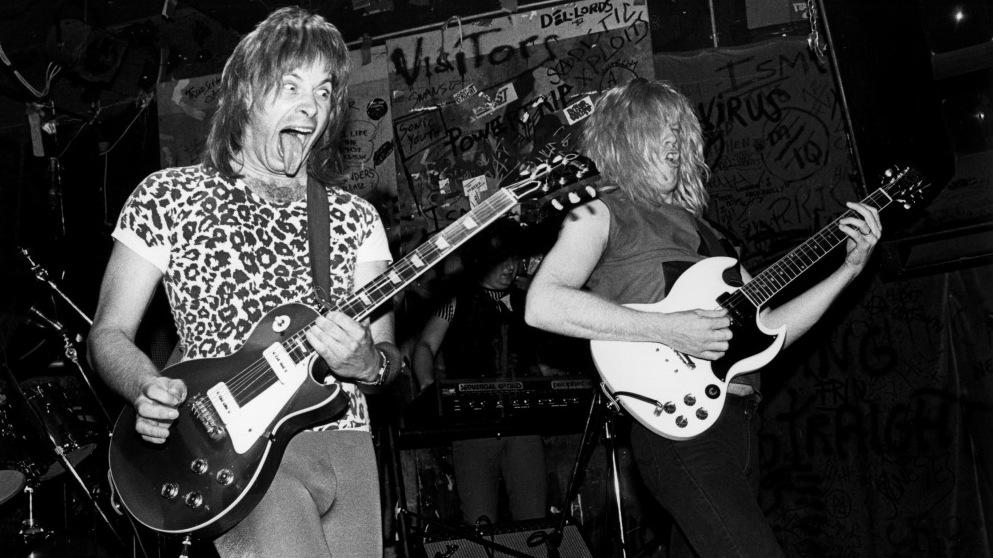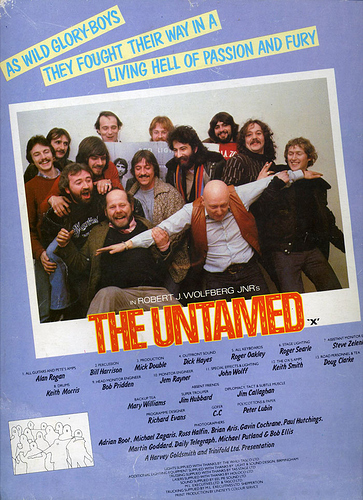German Oomphta has certainly scarred many souls. And it’s even scarier when you look at the modern variants. This video is of a local AA meeting (Kirchweih, fun fair) with one of the most successful bands there.
Watch and be glad to be far away
I can relate with what you’re saying. I haven’t had many moments where something I was practicing finally ‘clicked’. But then again I need something or someone to give me motivation and direction when I sit down to practice.
I used to go to open jams all the time, after I got over my initial phobia of playing in front of people. Picked up quite a few tips and tricks from players. One guitar player said something I’ll never forget though.
I had asked him once about his practice routines and how he structures them. Without even thinking he said to me… “you’ll learn more in 1 night here on-stage than you will in a week of practicing in your basement”. And he was right, to a certain extent.
It was the same with me in a lot of ways. I’m a bit of a late developer, as it were. I so wish that I’d have had a good “mentor” when I was young. My life would have been so different. But, what you gonna do? Looking at so many successful people, it’s often the case that apart from talent, they were also in the right place at the right time.
Ouch indeed. My first music teacher (I can still remember her name, Miss Goodliff. Although she was a withered old spinster, and there was little about her that was good) used to make “miscreants” stand next to her at the piano, with their hands spread out on top of said piano. She had a ruler on top of this piano, which she would, on occasion pick up, and smash down rather forcibly (using the side of the ruler) on the back of those little hands. All at the tender age of 7. What a nice lady. Those were the days.
Wow, that might be termed one helluva “sub-dominant 7th (year)” !
What might be the male equivalent of a “withered old spinster” ? “Gracefully aging wily playboy” ? 
One of my old tutors used to say that “you have to be 6times better in your bedroom than you will be on a gig.” Meaning that you will play 6 times worse on stage than you do at home, alone. That’s a bit of an exaggeration, but not that much. It’s a bit like combat sports in a way. (Although the result of failure is rather different) . Doesn’t matter how much you train, or spar, you’ll never replace the experience of climbing into a ring or cage, facing a beast, and fighting for your life. As someone who has fought for his life, I suspect real combat was rather different than the training.
A sad, miserable old man, would be good for starters. The dominant old bitch used to wear a hair net too, which led to some, often witty repartee (if 7 year olds are capable of wit) Interestingly, it was Electric Ladyland that saved the day for me too.
True enough. “Academics” melt away nearly instantaneously when the ear (or perhaps some given “audience’s” ears) is not “inspired”. Playing with others involved as much careful listening as careful playing. Did not do much of that. Basically incapable of memorizing moves and playing identical melodies even twice. Also am a hack at rhythm in general. Could do timing within melody lines with an already existing structure. My (predominant) playing along (generally alone) with my favorite artists on the stereo allowed me to take an undisciplined tact towards absorbing and incorporating (some) of their tasty moves - without worrying about an “audience” (other than perhaps irritated neighbors next door).
Many of the “greats” that I liked were largely self taught, clearly played for themselves and their own enjoyment first off, and would not relinquish their mood/artistry to “popular demands” in performance.
Thunder lizard. Didn’t know that. You learn something new every day. Hopefully.
“Thunder Lizard” might be a pretty good name for some sort of “thrash metal” band ? My favorite prospective punk band names were, “Amino Casino”, “Rat Brain Homegenate”, and “Chronic Spinal Dog”. Neuro-psycho-pharmacology literature is chocked full of rather entertaining phrases like that.
Nor did I. happened upon it last night looking into the etymology. Here’s the “skinny”:
I have to agree. It would make a great name for a heavy metal band. As for the others being good for punk bands? Again, yes. Interesting (useless) bit of information for you, but did you know that Led Zeppelin spelt the name wrong (should really be Lead) because they thought that Americans would pronounce it “Leed” Zeppelin?
On the subject of academics, I tend to agree. However the really great ones do all end up “knowing their stuff” one way or another. There are exceptions of course. I would put Hendrix in that category. Technically he was no where near as good as people say, but he changed the way we view the electric guitar forever. He is therefore, by dictionary definition, a genius. Electric Ladyland still holds up. Charlie Parker was self taught. However as soon as he started playing in big bands, the leaders of those bands recognised his talent, and taught him tons of stuff. He knew what he was doing. The exact same thing happened to Pat Metheney.
I have always thought that the names Daft Leper or Deft Leotard might have been more intriguing ?

Source: https://mediad.publicbroadcasting.net/p/shared/npr/styles/x_large/nprshared/201805/142246886.jpg
Deft Leotard. Like it, and the reference to Spinal Tap. I was thinking about “being in the right place at the right time,” and Led Zeppelin are a prime case in point. The first vocalist Jimmy Page wanted was a man called Terry Riley. He refused as he’d just been offered a solo record contract. Page then had to search the country for a vocalist and a drummer. Could you imagine Zeppelin without Robert Plant, who was also the one who suggested John Bonham, his friend, as the drummer. Somehow I just don’t think it would have been the same.
Never was that excited about Lug Zep (IMO, first 2 albums were pretty good). Page (just OK in my book). My (sometimes) juvenile humor always hearkens back to “Robert Planet” (from Zappa and the Mothers Live at Fillmore East 1971 - cued up to the comedic reference, for your listening pleasure).
I never quite understood why people thought (still think?) Jimmy Page was a great player. Sure, he gave us some memorable riffs here and there but in terms of technical ability he was never all that good…the exception being his Stairway solo.
Overall I think he was somewhat sloppy, especially on live recordings.
I also think it’s important to note that some non-players perspectives of a person’s skill level is (my opinion only) different from those of us who have played for any length of time. Our ears have been trained to discriminate and listen a bit more acutely. And with much respect to Hendrix, he played out of tune on several of his recordings. It’s too bad Floyd Rose bridges didn’t exist back in his day.
Can’t argue with you or Zen on this. I wasn’t putting up Jimmy Page as a player to emulate on a technical level. I merely mentioned Zeppelin as a band that easily might not have existed but for “fate,” and “being in the right place at the right time.”
I repeat, “we are not groupies !” … 
I would certainly not put Jimmy Page up as a player to emulate. The amount of incredible jazz players, rock players and some blues players today offer much greater challenges were one attempting to emulate their playing. He does however offer real insight into what is possible, with even the simplest of riffs, should you be working with the right people. And yes, his playing was very sloppy when playing live. I merely mentioned Zeppelin, as I said to Raven, as I think that they are a prime example of people being in the right place at the right time. If you want players to challenge you, you could start with Allan Holdsworth. Good luck with that one. Not everyone’s cup of tea musically, but if his playing doesn’t frighten the life out of you, then you’re not human.
He came to town years ago (late 1980s or early 1990s, I think), and I caught him in a small Ballard club with good acoustics here in “Rainy Day Dream Away” Seattle. Quite esoteric, and strangely interesting.
My friend John ‘Wiggy’ Wolff (Zep’s as well as The Who’s legendary sound and lighting guru) invited me to one of the Zeps’ gigs somewhere in London in December of 1972. They had a mountain of big ugly gnarly speakers cabs that they drove the piss out of in that large “dance hall” venue. It was easily 120 dB SPL (ear-bleeding stuff). I hated it, and spent most of the time backstage scarfing the snacks and guzzling a bit of whiskey. “Wiggy” always wore Levi jacket and pants, and tooted Coke off the ends of any handy flat-head screwdriver. Quite a fine fellow. Found some info about him when searching about:
Source: 1978 Who Exhibition
John is on the right:
Seems he pioneered The Who’s use of lasers in 1975. They came to Seattle, and I saw them then last.
1975 - First use of lasers:
The Who first used lasers on 18 Oct. 1975, at Granby Halls, Leicester.
Richard Barnes: “This tour was the first time they used their $36,000 lasers in the act and the first time lasers had been used in a rock show anywhere.”
The rock group The Who are generally recognised as pioneering the integration of the laser effects with music. John Wolff provided The Who with a few 90-second bursts of laser light from eleven lasers during their performances (Kallard 1979).
Excerpt from March 1976 article in Circus about the Fall 1975 U.S. tour kicking off in Houston:
Lighting for the concert was superb, with ultra-bright white spots situated at the rear of the stage and ignited at crucial moments (including the agonized screams in “Won’t Get Fooled Again”), flooding into the eyes of the audience. The group also experimented with laser beams (similar to the ones Led Zeppelin’s used on their last outing), which gave the effect of solid tubes radiating from the stage. The band was not allowed to use this laser setup in England, where the tour actually began in October, at the 8,000-seat New Bingley Hall in Stafford - so American audiences were the first to view its dramatic effect.
Excerpt from February 2010 Total Production International article featuring Wiggy on the development of lasers: Strung Out On Lasers:
The Who introduced the effect on a large scale in a UK venue for the first time, at the unlikely Granby Halls, Leicester, on October 18 1975.
Roger Searle, who worked with The Who between 1967-86, and was then their lighting technician along with Tony Haslam, remembers the show featuring “just a single Spectra Physics 164 argon laser with no laser table - perched on a box at the back of the stage.
“Water was fed from a garden hose, power via a few yards of flex that we had borrowed… with John Wolff holding the diffraction grating in between finger and thumb.”
Source: The First Rock And Roll Band To Feature Lasers at Concerts? | Page 3 | Steve Hoffman Music Forums
.


